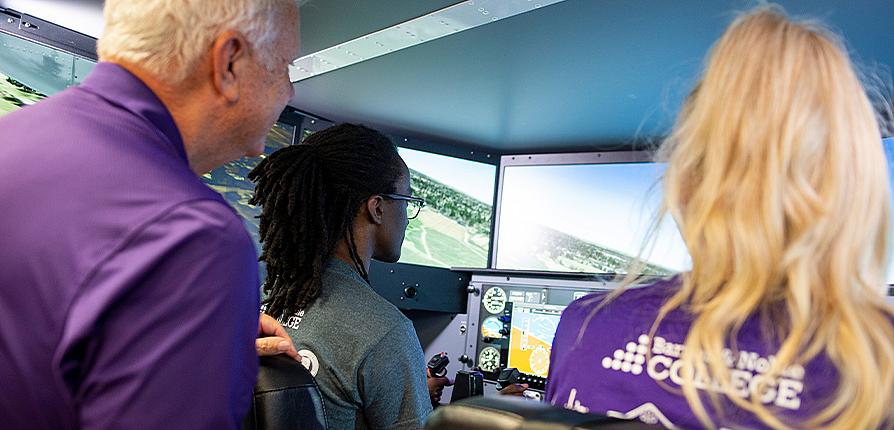SFA's new aviation sciences initiative takes flight
Story by Christine Broussard '10 & '20
Photos by Robin Johnson '99 & '19
As an institution intent on evolving academic offerings alongside industry demands, SFA's tradition of achieving greater heights continues with the addition of its aviation sciences initiative.
Offered through the James I. Perkins College of Education's School of Human Sciences, the initiative kicked off with a distinct set of aviation courses this fall.
"Our students will fly in state-of-the-art planes that boast some of the most advanced equipment, all from a new hangar built at the A.L. Mangham Jr. Regional Airport in Nacogdoches," said Dr. Judy Abbott, dean of SFA's Perkins College of Education.
Just last year, the SFA Board of Regents approved a partnership with HCH Aviation, a specialized aviation training school co-owned by SFA alumna Kristen Conklin '09, Jon Hughes and John Hasbun. The company is assisting SFA officials in developing and implementing the initiative based on industry standards and workforce needs.
"Both Kristen and her husband, Shannon, grew up in Nacogdoches and love the community and university, so helping build a program that could improve the lives of so many young people was a no brainer," said Hughes, co-owner and principal of HCH Aviation. "They believe we all have an obligation to help young people succeed, and this opportunity would give them the tools to be successful in a professional and rewarding career."
Unlike aviation programs offered elsewhere, SFA's stands apart in distinct ways — particularly in its promise that students will fly inside advanced aircraft during their freshman year. By the end of their first semester, they should have accumulated approximately 45 flight hours.
"SFA will be a gold-standard program aimed at not only graduating pilots, but also graduating pilots with the specific skills and knowledge that directly translate to the airline industry's unique cockpit environment," Hughes said. "SFA will be known throughout the industry for the quality of pilot it produces and, one day soon, it will be recognized on the world stage for its first-class professional pilot training program."
Lumberjacks also will receive focused mentorship from SFA faculty members.
"Currently, colleges and universities that offer aviation are experiencing student loads they cannot handle," Abbott added. "This is pushing flying two to three years further down their degree paths. Some other institutions are even closing their doors to new admissions. It's truly a perfect time for SFA to become involved in this coursework and degree plan."
While aviation courses are already being offered this fall, aviation sciences as a major should begin being offered in fall 2022, pending approval by the Texas Higher Education Coordinating Board and Southern Association of Colleges and Schools Commission on Colleges.
As a result, program graduates will not only hold bachelor's degrees, but they also will become private pilots; be qualified to become commercial pilots; and receive their instrument, certified flight instruction, and multi-engine ratings.
"We are training professional aviators, and there are many avenues in which the certificates and skills can be used," Hughes said. "They will be licensed to fly for airlines, corporate flight departments, aerial photography, law enforcement, sightseeing and more."
A baccalaureate-level degree also qualifies graduates for management positions with airlines, airports and private companies, and average compensation for qualified pilots and instructors is an even more enticing draw.
"The average salary for professional pilots is more than $140,000 annually," Hughes added, "making it a wonderful career opportunity for young people to consider."
Creation of the program did not happen overnight. Discussions surrounding the need for an aviation program at SFA began years ago, and that need was further exacerbated by the impact of the pandemic.
"Post-COVID-19 press releases from airline CEOs have been very specific about the need for new pilots," said Dr. Chay Runnels, professor and interim director of the School of Human Sciences. "Boeing released a study in 2020 that projected 763,000 new civil aviation pilots will be needed globally in the next 20 years. In this country alone, almost half of the current airline pilots will be retiring in the next 10 years."
Outreach to East Texas middle and high school students also will be an integral part of the program.
"Kristen and Shannon have a deep-seated commitment to give back to the kids, so part of the aviation program will be to bring students from surrounding school districts to SFA, let them fly the simulators and present them with their first logbooks," Hughes said. "They won't all become aviation professionals, but each will have their eyes opened to unknown potential."
With the partnership firmly established, SFA's human sciences faculty members are eager to begin assisting HCH Aviation in seeking their passion for pairing education and flight.
"This unique private/public partnership has the potential to reach many students who dream of an aviation career," Abbott said. "We are committed to creating a superior program that will be first class in the state and nation."
To read more about SFA's newest program, visit sfasu.edu/aviation.
Top Image: Two students practice takeoff in SFA’'s state-of-the-art Redbird flight simulator. As SFA's new aviation program director, Jim Williams, left, instructs the students in piloting basics. Program graduates will receive not only a bachelor's degree, but also will become private pilots with multiple flight certifications.
 Axe ’Em, Jacks!
Axe ’Em, Jacks!
